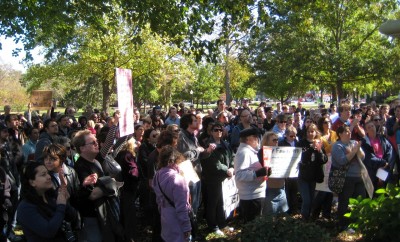I’m generally against zero-tolerance policies. I’ve read too many stories about kids expelled because of an asthma inhaler or a pocket knife forgotten in a jacket pocket (or in the trunk of a car) and accidentally brought to school. Those sorts of harmless, technical violations of the rules are exactly the sort thing that should be tolerated.
But there’s one zero-tolerance policy that I’d really like to see. Prompted by the gruesome story Occupy Oakland: second Iraq war veteran injured after police clashes, about a man beaten so badly by police that his spleen was lacerated, who was then denied medical care for 18 hours, I think we need a zero-tolerance policy for failure to provide medical care to prisoners.
Every person involved in taking or holding a prisoner—police, guards, staff, managers—should be absolutely responsible for doing everything necessary to ensure that needed care is provided.
If needed care is not provided, everyone who heard the prisoner request care, saw the prisoner in distress, or got a report that the prisoner needs or has requested care, should be fired.
There should be no exceptions.


